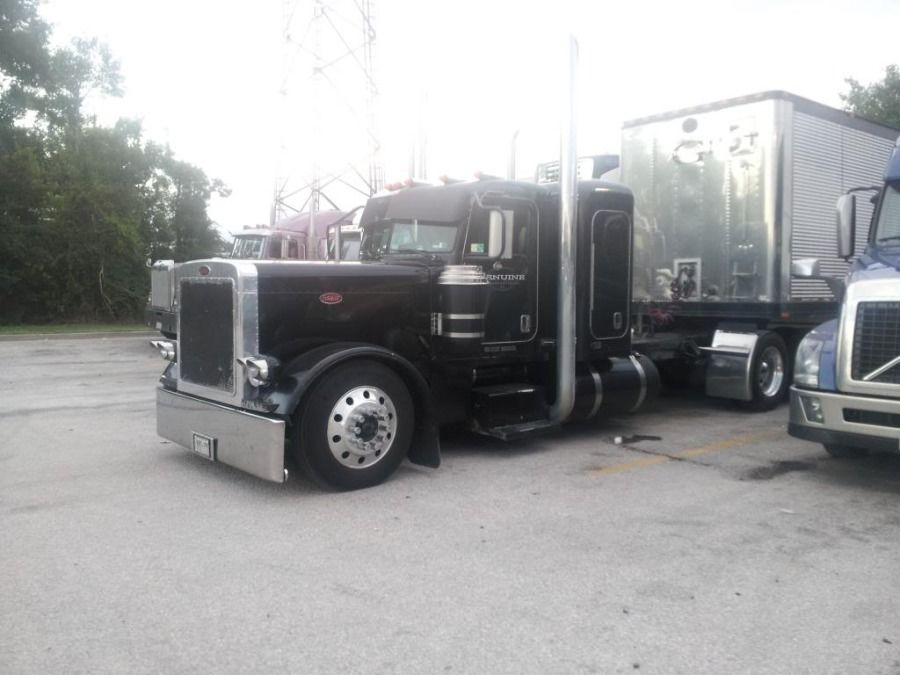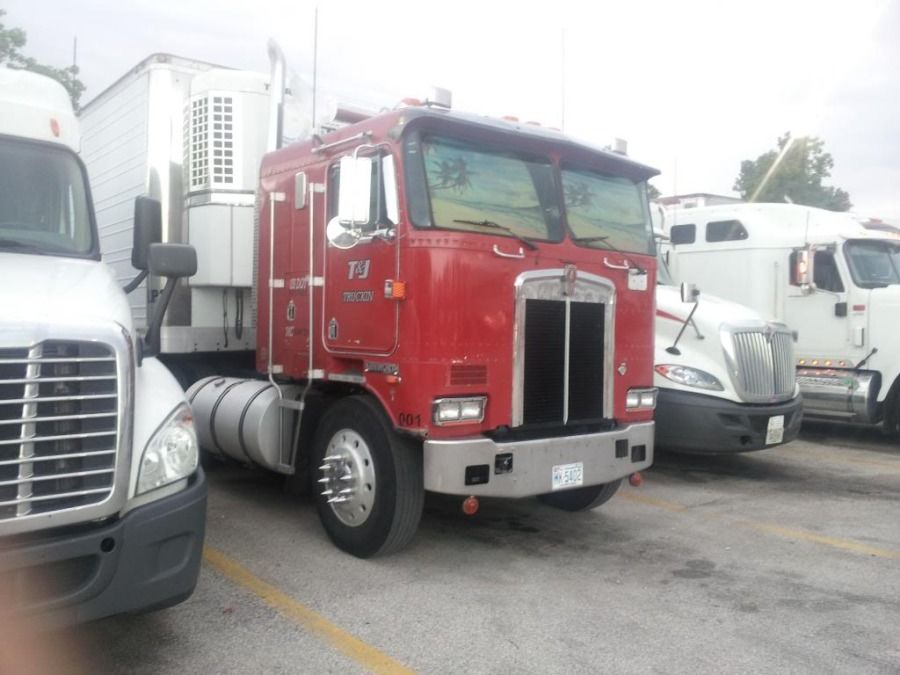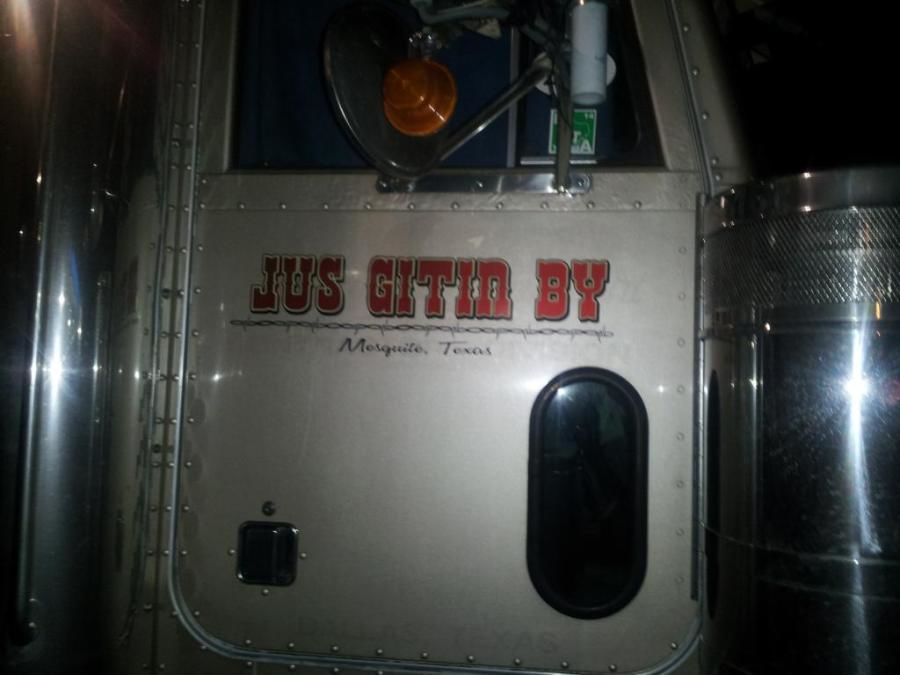How Old Of A Truck Can You Actually Operate Legally According To DOT?
Topic 4431 | Page 1

For example, here's an '84 cabover with sleeper I just found on CL.. http://yakima.craigslist.org/cto/4535952695.html

I would love an old truck to fix up and drive around but I don't think I would ever try to run a business with one, especially OTR.
OTR:
Over The Road
OTR driving normally means you'll be hauling freight to various customers throughout your company's hauling region. It often entails being gone from home for two to three weeks at a time.
Paul, it does't really matter about the age of the truck as long as it's legal. Now, if it is old and "ratty" looking you are going to get inspected more often than you like, but that's because thy know they are bound to find something wrong - in other words, you will have a big target on you. I see a lot of older "restored", or even, well maintained trucks on the road.
Here's a couple of them I was parked near at a truck stop not too long ago.


Paul the thing about trucks is that they are "money pits" - if you've just got money to burn and don't mind taking on a hobby that is gonna drain you then go for it! I was in business for thirty years before becoming a driver, I had six big trucks at one time. Trust me I know what kind of drain they can be. It's not all a bed of roses being an owner/operator - they work harder than any other drivers, and have to take some incredible financial risks just to make a small percentage more than a good company driver can make. This is a commodities business and the person who can do the job the cheapest always has all the work - the big trucking companies have a huge advantage over the independent truckers because they can spread their losses out over a much larger number of trucks in their fleet, they can negotiate much better prices on their national tire and maintenance accounts, and get some huge fuel discounts over the smaller operations. There are so many ways they can get better deals than an independent operator that it makes it very tricky to stay in the game with them, and they don't mind losing money if it means they can get rid of the smaller guys that are bugging them all the time.
Just thought I'd point out some of the pit-falls of the game. You don't want to end up like the owner operator I recently came across from Mesquite Texas who so aptly named his business because of the business climate that truckers are facing in today's market place.

Owner Operator:
An owner-operator is a driver who either owns or leases the truck they are driving. A self-employed driver.

You will need to research this. As long as it can pass a Dot Inspection you can drive it but remember you have to be compliant in all the areas you will be running in. Those 2 trucks you mentioned could not run in California due to emissions regs with Carb. Even the ports are getting strict on what kind of trucks can go into the ports.
DOT:
Department Of Transportation
A department of the federal executive branch responsible for the national highways and for railroad and airline safety. It also manages Amtrak, the national railroad system, and the Coast Guard.
State and Federal DOT Officers are responsible for commercial vehicle enforcement. "The truck police" you could call them.
HOS:
Hours Of Service
HOS refers to the logbook hours of service regulations.A lot also depends on if you plan on running your own Authority (interstate or intrastate) or "leasing on" to a carrier.
Most of the OO/Lease companies (Landstar for example) have a maximum age they would allow.
If you are simply "running cans" from port to end user, intrastate , then it shouldn't really matter - save for the cost (and limited parts availability) of keeping the rig on the road.
Rick
Interstate:
Commercial trade, business, movement of goods or money, or transportation from one state to another, regulated by the Federal Department Of Transportation (DOT).
Intrastate:
The act of purchasers and sellers transacting business while keeping all transactions in a single state, without crossing state lines to do so.
New Reply:
New! Check out our help videos for a better understanding of our forum features

















Preview:








 TT On Facebook
TT On Facebook
OK, I'm still looking at going through one of the CDL Training schools for someone like Swift or CR England but, I've always wondered...
Once I get a couple of years under my belt, what vintage of older trucks out there would be legal to operate on the highways?
I'm talking as an owner/operator, maybe Intermodal as I live near the Portland Port.
I'm always surfing on Craigslist and today I found a White Freightliner that's a '78 model, cabover day cab. The other day I saw a '68 Kenworth conventional with a sleeper that's been a farm truck it's whole life so I'm thinking the miles might not be in the millions..
What kind of resistance would I get if I pulled up to haul a load with a '68 Kenworth provided everything was in decent shape (ok, it's got manual steering but still... ) Would anyone trust that truck to haul their freight?
CDL:
Commercial Driver's License (CDL)
A CDL is required to drive any of the following vehicles:
Day Cab:
A tractor which does not have a sleeper berth attached to it. Normally used for local routes where drivers go home every night.
Intermodal:
Transporting freight using two or more transportation modes. An example would be freight that is moved by truck from the shipper's dock to the rail yard, then placed on a train to the next rail yard, and finally returned to a truck for delivery to the receiving customer.
In trucking when you hear someone refer to an intermodal job they're normally talking about hauling shipping containers to and from the shipyards and railyards.